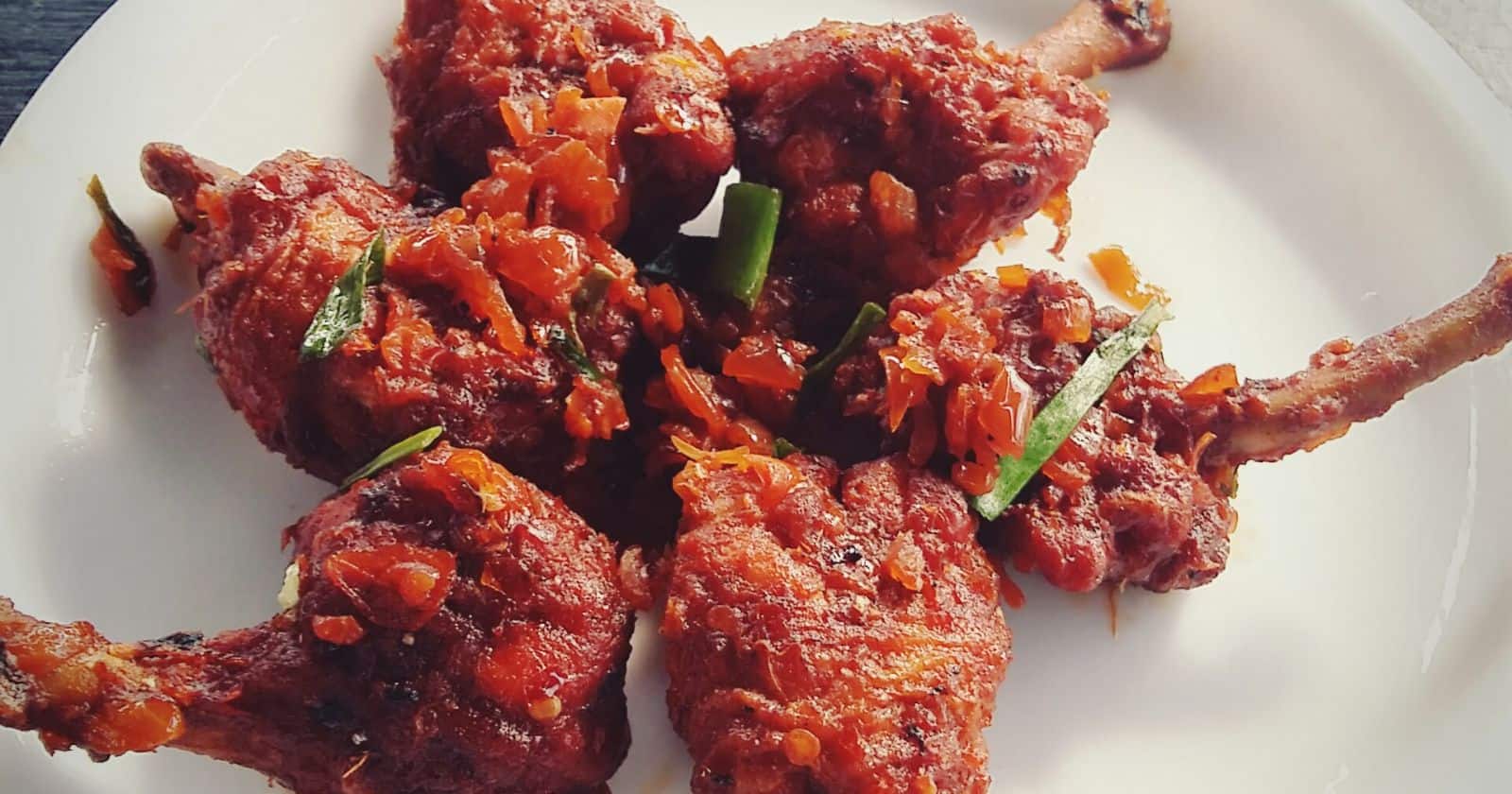If you’re a
The spices, sauces, and seasoning that make chicken wings and other chicken dishes mouth-wateringly hot for humans do not agree with canine digestion. The capsaicin in peppers and hot sauce can severely irritate your dog’s stomach, intestines, and airways. At best, spicy chicken will cause some tummy troubles. At worst, it can prompt an emergency vet visit.
While plain chicken can be a healthy protein for dogs, spicy versions place your pup at risk of reactions like vomiting, diarrhea, and breathing issues. It simply isn’t worth the gamble for a dog’s safety and comfort. This article will explain exactly why spicy chicken is off limits for dogs and how to feed chicken safely. Let’s take a closer look at how spicy foods affect canine health.
How Spicy Foods Affect Dogs
Before diving into whether dogs can handle spicy chicken specifically, let’s look at how spicy foods in general affect canine health.
The active ingredient that makes foods taste spicy is capsaicin. This chemical compound binds to pain receptors in the mouth, which is why spicy foods cause a burning sensation.
Dogs have the same pain receptors as humans, so they will perceive spicy foods as “hot” in the same way we do. However, dogs are much more sensitive to capsaicin than people. What may be mildly spicy to you can feel intolerable for your dog.
When dogs ingest spicy foods, it’s common for them to experience:
- Excessive panting
- Drooling
- Lip licking
- Paw scratching at the mouth
In severe cases, spicy foods may cause:
- Stomach pain or vomiting
- Difficulty swallowing
- Respiratory distress
This is because capsaicin irritates dogs’ gastrointestinal tracts and can constrict airways. Dogs do not have the physiological ability to process spicy flavors like humans can.
So, in general, veterinarians recommend avoiding feeding spicy foods to dogs. Their digestive systems just aren’t equipped to handle it. But what about specific spicy dishes, like buffalo wings? Let’s look at whether it’s okay for dogs to eat spicy chicken.
Are Spicy Chicken Products Harmful for Dogs?
Chicken alone is a lean, nutritious protein source that most dogs can eat. However, spicy seasonings and sauces turn a dog-safe food into a potential hazard. Here are a few spicy chicken products you should never feed your dog:
Buffalo Wings
This popular appetizer is fried chicken slathered in a thick, buttery sauce flavored with cayenne pepper. The combination of fatty, heavily spiced chicken is a recipe for disaster if your dog gets ahold of it.
Both the fried coating and the spicy sauce are hard for dogs to digest. They may lead to stomach upset, diarrhea, or vomiting. It’s best to keep platters of buffalo wings away from your dog at game day parties or restaurant outings.
Nashville Hot Chicken
A trendy dish in recent years, Nashville hot chicken is another spicy fried chicken meal. Boneless chicken pieces are dredged in cayenne pepper batter and drizzled with an oily pepper sauce.
This ultra-spicy chicken contains irresponsibly high levels of pepper even for human consumption. The capsaicin content is off the charts for dogs, who should never eat this menu item. Steer clear of sharing even tiny bites with your pup.
Spicy Chicken Tacos or Burritos
Mexican restaurants often incorporate spicy marinades or peppers into chicken tacos, burritos, fajitas, and other dishes. Onions, garlic, and other seasonings may also cause stomach upset in dogs.
While plain chicken tastes great in tortillas or flatbreads, spicy preparations are not safe for canine consumption. The pepper-packed seasonings and sauces can irritate dogs’ digestive tracts.
Spicy Chicken Wings Dog Treats
You may find packaged dog treats modeled after buffalo chicken wings in pet stores. These often contain cayenne and other spices to mimic the flavor. However, just because they’re marketed for dogs doesn’t mean they’re healthy.
Spicy dog treats are still irritating for dogs to digest. They contain many unnecessary additives as well. Your dog will be better off with a bland, baked chicken strip without any spicy coatings or seasonings.
The bottom line is that all spicy chicken products should be kept away from dogs. The capsaicin, fat content, and other additives create a cocktail of stomach irritation. Dogs simply lack the physiology to digest these flavors comfortably.
Should Dogs Eat Fried Chicken?
Fried chicken tends to go hand-in-hand with spicy chicken. Dishes like buffalo wings, Nashville hot chicken, and crispy chicken tacos are usually cooked in bubbling oil before being slathered in
Unfortunately, the frying process itself makes chicken unhealthy for dogs. Here’s why fried chicken is difficult for dogs to digest:
- Greasy coating – The fried batter or breading is dripping in unhealthy fats that can upset your dog’s stomach.
- High calorie – Fried chicken is loaded with extra calories from the oil, which can quickly lead to weight gain in dogs.
- Toxic coating – Some fried batters contain onion or garlic powder, which are toxic to dogs.
- Bone splinters – Frying makes chicken bones brittle and likely to splinter, causing mouth or intestinal injuries.
- Cooking method – Frying destroys nutrients and introduces free radicals that may cause cancer over time.
Lightly cooked plain chicken is vastly healthier for dogs. Baking, grilling, or poaching are safe cooking methods that don’t require any oil or batter. The finished chicken should be completely unseasoned without any charring or crispy coating.
So fried chicken, even the non-spicy kinds, is not worth feeding your dog. An occasional scraped off meaty bite won’t necessarily harm your dog, but make fried chicken a very rare treat at most. Baked or poached chicken is a much better choice for your dog’s long-term health.
Healthier Ways Dogs Can Eat Chicken
Now you know spicy chicken is bad news for dogs. But chicken without any spicy additives can be a nutritious part of your dog’s diet. Here are some dog-safe ways to feed chicken:
- Plain baked or boiled chicken: Simple cooked chicken without oil, bones, or seasoning is easy for dogs to digest and provides lean protein.
- Mild chicken gravy: Light chicken gravy without onions or garlic makes dry kibble more appetizing. Avoid heavy, spicy gravies though.
- Canned chicken: Sodium-free canned chicken blended with water is an easy addition to dog food. Look for brands packed in water without additives.
- Dehydrated chicken strips: Low-sodium dehydrated chicken is a shelf-stable chewy treat. Watch sugar content in flavored products.
When preparing chicken for your dog at home, avoid frying. Bake, boil, or poach chicken breasts instead so they retain nutrients without becoming greasy.
Remove all bones, skin, and fat before feeding chicken to reduce stomach upset risks. Never season chicken with onions, garlic, or peppers either. A bland baked chicken breast offers all the benefits of this protein without the drawbacks of spicy versions.
What If Your Dog Accidentally Eats Spicy Chicken?
If your pooch manages to snag some spicy chicken against your best efforts, take action right away to get it out of their system. Here are some tips if your dog eats spicy chicken:
- Induce vomiting if they just ate it. Hydrogen peroxide can make dogs vomit up the chicken before it’s digested.
- Call your vet. Describe the chicken they ate and ask about giving antacids or anti-nausea medication.
- Avoid solid foods for 24 hours. Let their stomach rest by skipping meals and restricting water intake.
- Monitor for reactions. Watch for vomiting, diarrhea, excessive thirst, stomach pain, or breathing issues.
Hopefully your dog will regurgitate or pass the spicy chicken quickly with no lasting effects. However, some dogs may need IV fluids or medications if reactions are severe. It’s critical to get veterinary advice right away if your dog eats spicy chicken.
The best approach, though, is simply keeping spicy temptations out of reach. Monitor your dog closely around party foods and ask others not to share. With reasonable precautions, you can feel confident knowing your dog won’t have the chance to eat spicy chicken.
The Takeaway: Mild Chicken Only for Dogs
To summarize, spicy chicken dishes seasoned with peppers or hot sauces are not safe for dogs. Canine digestive systems do not process capsaicin properly. Spicy chicken may lead to stomach upset, pain, and respiratory distress in dogs.
However, plain cooked chicken without any seasoning makes a healthy, dog-safe addition to your pup’s diet. Just avoid spicy coatings or gravies, and always monitor your dog around chicken meals to prevent accidental ingestion.
While you may need to forego sharing your hot wings, your dog will thank you for sticking to mild chicken flavors. Using smart precautions, you can safely enjoy chicken together in dog-approved forms. Your furry friend will reap the nutritional benefits without any spicy side effects.





